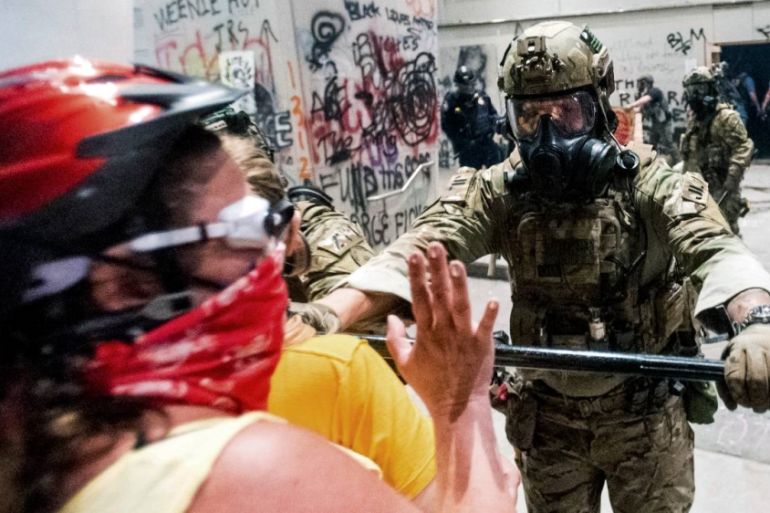Trump to send federal officers to US cities to tamp down unrest
US President says ‘Operation Legend’ will send hundreds of troops into Chicago, and other cities will follow.

President Donald Trump and Attorney General William Barr announced Wednesday that federal agents will surge into Chicago and Albuquerque to help combat rising crime, expanding the administration’s intervention in local law enforcement as Trump runs for re-election in the United States.
“Frankly, we have no choice but to get involved,” Trump said at the White House event where he made the announcement.
Keep reading
list of 4 itemsIn Mexico’s election, candidates grapple with the search for the missing
Kazakhstan jails former minister for 24 years over wife’s torture, murder
Key takeaways as ex-Trump lawyer Michael Cohen testifies in New York trial
“Politicians running many of our cities have put interests of criminals above law-abiding citizens,” Trump said.
“These same politicians have now embraced the far-left movement to break up our police departments, causing violent crime in their cities to spiral – and I mean spiral seriously – out of control,” Trump said, citing murder rates in New York, Philadelphia, Minneapolis and Chicago.
Trump said he is deploying hundreds of agents to Chicago from the Federal Bureau of Investigation, Bureau of Alcohol, Tobacco, Firearms and Explosives (ATF), the Drug Enforcement Agency (DEA), the US Marshals Service, and the Department of Homeland Security (DHS).
The federal officers will work with local law enforcement to identify, arrest and prosecute violent criminals, the president said.

Barr said the “Operation Legend” programme is modelled on federal anti-gang enforcement efforts begun in the mid-1990s and a new programme begun recently in Kansas City, Missouri, in response to deadly shootings.
Barr said there has been a “significant increase in violent crime in many inner cities” following the racial justice protests triggered by the May 25 police killing of George Floyd in Minneapolis.
The protests were an “extreme reaction that has demonised police” and directly resulted in a rise in crime, Barr said.
Hundreds of federal agents already have been sent to Kansas City, Missouri, to help quell a record rise in violence after the shooting death of a young boy there. Sending federal agents to help localities is not uncommon.
Barr announced a similar surge effort in December for seven cities that had seen spiking violence.
Usually, the Justice Department sends agents under its own umbrella from the ATF or DEA, but this surge will include at least 100 DHS officers working in the region who generally conduct drug-trafficking and child-exploitation investigations.
Trump has linked the growing violence in the streets with protests over racial injustice, though criminal justice experts say the spike defies easy explanation, pointing to the unprecedented moment the country is living through – a pandemic that has killed more than 140,000 Americans, historic unemployment, stay-at-home orders, a mass reckoning over race and police brutality, intense stress and even the weather. And compared with other years, crime is down overall.
Local authorities have complained that the surges in federal agents have only exacerbated tensions on the streets.
The decision to dispatch federal agents to US cities is playing out at a hyper-politicised moment when Trump is trying to show he is a “law-and-order” president and painting Democratic-led cities as out of control. With less than four months to go before Election Day, Trump has been serving up dire warnings that the violence would worsen if his Democratic rival Joe Biden is elected in November.
But civil unrest in Portland only escalated after federal agents there were accused of whisking people away in unmarked cars without probable cause.
The spike in crime has hit hard in some cities with resources already stretched thin from the pandemic. But the move to send in federal forces was initially rejected by local leaders.
Chicago Mayor Lori Lightfoot later said she and other local officials had spoken with federal authorities and come to an understanding.
“I’ve been very clear that we welcome actual partnership,” the Democratic mayor said on Tuesday after speaking with federal officials. “But we do not welcome dictatorship. We do not welcome authoritarianism, and we do not welcome unconstitutional arrest and detainment of our residents. That is something I will not tolerate.”

Operation Legend – named after four-year-old LeGend Taliferro, who was fatally shot while sleeping in a Kansas City apartment late last month – was announced on July 8. The first arrest came earlier this week.
The Trump administration is facing growing pushback in Portland. Multiple lawsuits have been filed questioning the federal government’s authority to use broad policing powers in cities. One suit filed on Tuesday said federal agents are violating protesters’ 10th Amendment rights by engaging in police activities designated to local and state governments.
Oregon’s attorney general sued last week, asking a judge to block federal agents’ actions. The state argued that masked agents had arrested people on the streets without probable cause and far from the US courthouse that has become a target of vandalism.
Federal authorities, however, said state and local officials had been unwilling to work with them to stop the vandalism and violence against federal officers and the US courthouse.